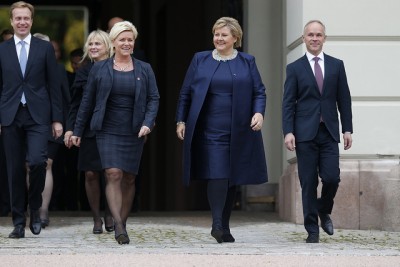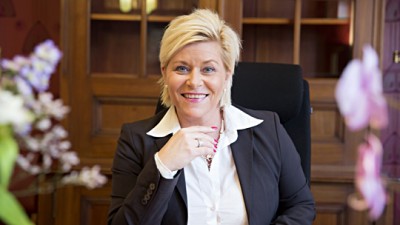NEWS ANALYSIS: It’s been 100 days since members of Norway’s new conservative government triumphantly walked out of the Royal Palace after their first official Council of State with King Harald. The symbolic milestone has predictably led to assessments of the government’s progress so far, with Prime Minister Erna Solberg claiming, not surprisingly, that she’s quite pleased with initial accomplishments.

“Among other things we have put resources into continuing education for teachers, reduced taxes for ordinary folks and business owners, increased investment in infrastructure and provided extra means of shortening waiting lists for health care,” Solberg told newspaper Dagsavisen.
Both Solberg of the Conservative Party (Høyre) and Finance Minister Siv Jensen of the Progress Party (Fremskrittspartiet, Frp) were celebrating their symbolic 100-day anniversary in office at the World Economic Forum in Davos, Switzerland, with a cake with 100 candles. There they could also mingle with other government leaders and some of the most powerful people in the world and, as Jensen told state broadcaster NRK earlier this week, gain insight and inspiration from others in similar positions. It was the first time either Solberg or Jensen were attending the prestigious gathering and they had packed programs.
Defending their record
They couldn’t ignore the analysis back home of their progress so far, however, and both have been forced to defend their record. Former Labour Prime Minister Jens Stoltenberg, who now leads the opposition in parliament, clearly felt a need to find fault, and lashed out on Wednesday against the government’s “old-fashioned” family politics and measures that he claims inhibit growth.
“I’m surprised and uneasy over the brisk tempo and scope of the changes they’re making,” Stoltenberg told Dagsavisen on Thursday. He pointed to what he called “more expensive” day care, 7,000 fewer day care spots for children, cancellation of two day care enrollments a year, increases in so-called kontantstøtten (the amount of money a family gets if one parent opts to stay home with their child instead of enrolling him or her in day care), maintaining a tax rule that can benefit families with one non-working spouse (skatteklasse 2), reductions in the amount of mandatory paternity leave and what the opposition believes is a weakening of Norway’s abortion law.
Debate over proposed changes to the abortion law, which would allow doctors to opt out of performing abortions or referring patients for abortions, has been flying this week and has even caused unease within the Conservative and Progress parties themselves. Solberg and Jensen caved in on the issue to the Christian Democrats (Kristelig Folkepartiet, KrF) in an effort to secure their support on other issues in parliament, since Solberg’s two-party coalition lacks a clear majority of its own. But polls show that as many as two-thirds of Norwegians and the party’s own members object to the proposed abortion law changes, and that they think the Christian Democrats have received far too much influence on the issue given their voter support (less than 6 percent). If individual Members of Parliament are allowed to vote as they like instead of simply following their parties’ position, the proposed changes may not pass.
Internal rumbling
Stoltenberg also said he fears the Solberg government’s policies will lead to wider gaps between rich and poor in Norway, a country where they’ve been relatively narrow for decades because of the social welfare state. He nonetheless said he expects to remain in opposition for the full four years of the new government’s term, an indication that the new government isn’t so fragile that it may fall before its elected term is out.

There is internal rumbling within the government parties, though, not least in the Progress Party, which has seen its voter support tumble from the 16.3 percent that it won in the September election to around 12 percent in recent public opinion polls. The party has had to compromise on several issues for the sake of government power and unity, and may not be able to push through other policies it’s long sought, like easing Norway’s protectionist regulations on food imports. Even though it has support from the Conservatives, both government parties will need support from other parties in parliament, thus threatening the government’s efforts to overhaul Norway’s highly regulated and protected farming industry, for example. The Liberal Party (Venstre), another small support party in parliament, seems to have changed its mind on may vote to leave protectionist policies in place, thus letting down both many of its voters and the government.
Jensen says she understands that many of her party’s members are impatient and want to see more change, more quickly. The government is getting some good reviews, though, from both opposition and support parties in parliament. “I remember the (former left-center) government’s first term, when we waited and waited (for new initiatives),” said Dagrun Eriksen of the Christian Democrats. “Now we have a government made up of two parties that also must cooperate with two (including her own) in parliament. And they still have launched a whole lot of initiatives.”
Environmental organizations are critical, though, claiming that the government simply continues to leave Norway reliant on the oil and gas industry and isn’t doing nearly enough to tackle carbon emissions. Nor, arguably, did the former left-center government, and few believe there will be many brakes put on oil and gas exploration and production.
Welcomes the impatience
As Aftenposten noted, though, the Progress Party’s Jensen claims she’s glad her party members are impatient and expect results. Even though she had to go along with things like slightly raising alcohol taxes and voting in favour of a climate agreement, the government has done away with inheritance taxes, offered billions in tax relief and provided new billions for road improvements and removal of some toll systems.
“All of our ministers (seven in the new government) have delivered quite well,” Jensen told Aftenposten. “We have experienced that things can take more time than we want, but we’ve still launched many projects.” She says she’s not worried about the polls, at least not yet, and she was happy to eat cake with Solberg in Davos on Friday.
newsinenglish.no/Nina Berglund

